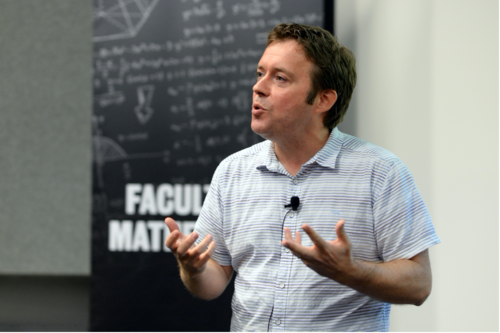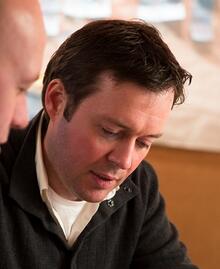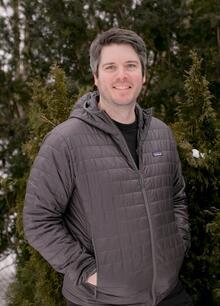The Daily Bulletin is published by Internal and Leadership Communications, part of University Communications
Contact us at bulletin@uwaterloo.ca
Submission guidelines
Editor:
Brandon Sweet
University Communications
bulletin@uwaterloo.ca

Professor Lank delivering a talk at the 2018 Cheriton Research Symposium.
A message from the Cheriton School of Computer Science.
We are saddened to announce that our dear friend, mentor and colleague Edward Lank, Professor at the Cheriton School of Computer Science, passed away on March 21, 2022 at the age of 49.
Professor Lank was born on November 28, 1972 and grew up in Ebenezer, a village northwest of Charlottetown on Prince Edward Island. He received an honours bachelor’s degree in physics in 1994 from the University of Prince Edward Island and a PhD in computer science from Queen’s University in 2001.
After completing graduate studies, Professor Lank worked as a postdoctoral researcher at the Xerox Palo Alto Research Center. In January 2002, he began his academic career as an Assistant Professor at San Francisco State University in the Computer Science Department. While at San Francisco State University, he received a National Science Foundation Career Award, the Foundation’s most prestigious award that recognizes and supports the early career development of scholars destined to become academic leaders.
 Professor Lank joined the Cheriton School of Computer Science as an Assistant Professor in June 2006. He was promoted to Associate Professor in July 2011 and to Full Professor in July 2018. With his colleague Michael Terry, Professor Lank co-founded Waterloo HCI, a university-wide consortium of faculty members and students who conduct research in the field of human-computer interaction.
Professor Lank joined the Cheriton School of Computer Science as an Assistant Professor in June 2006. He was promoted to Associate Professor in July 2011 and to Full Professor in July 2018. With his colleague Michael Terry, Professor Lank co-founded Waterloo HCI, a university-wide consortium of faculty members and students who conduct research in the field of human-computer interaction.
Professor Lank’s primary research interests were in intelligent user interfaces; mobile, multi-touch and free-space gestural interaction; and movement and input modelling in interfaces. His projects included work in mechanisms for leveraging reject rates to increase the perceived reliability of recognition-based user interfaces. He explored the design of free-space gesture input languages such as motion gestures and mechanisms for treating motion gestures. He and his students explored techniques for predicting target locations in goal-directed movements such as pointing and speed profiles in constrained movements in interfaces.
Professor Lank was interested in all aspects of human-computer interaction. His work also explored persuasive technologies, sustainability, computer-supported cooperative work, usable privacy and security, sketch and diagram recognition, and human-in-the-loop information retrieval.
The consummate graduate advisor, Professor Lank placed the interests of his students foremost by providing guidance and encouragement so they could perform research at their fullest potential. His goal was to mentor students so they become individuals who conduct strong research and prepare papers as independent scholars and scientists.
From 2018 to 2021, Professor Lank held a Cheriton Faculty Fellowship, a prestigious recognition that supports the work of leading faculty at the School of Computer Science. He was also an Inria International Research Chair attached to Équipe LOKI at Inria Lille-Nord Europe in Villeneuve d’Ascq, France. Alongside his many research positions, he also served as Associate Director of Undergraduate Studies from 2011 to 2013 and as Associate Director from 2013 to 2015 at the Cheriton School of Computer Science.
Professor Lank is survived by his beloved wife, Michelle, and his loving daughters, Olivia and Charlotte. He rests at Maison du Funeraille, Mouvaux, France. A memorial service was held on Saturday, March 26, 2022.
In lieu of flowers, Professor Lank’s family requests that donations be made to the Canadian Heart and Stroke Foundation or to the Site federation France AVC.
We extend our deepest sympathies to Professor Lank’s family.
Read recollections and tributes from Professor Lank's colleagues
A message from Information Systems & Technology (IST).
Currently, a mix of date formats is used across campus, leading to confusion when viewing the date, or making it difficult for system-to-system communication. For example, the date 03/05/2022 can be interpreted as March 5, 2022, or May 3, 2022.
In 1997, the Canadian Federal Government adopted the International Organization for Standardization (ISO) 8601 standard, which sets out an internationally agreed upon way to organize dates, formatting them in descending order of Year, Month, Date (YYYY-MM-DD), using hyphens instead of slashes. This standard minimizes ambiguity around dates and allows systems and software to integrate more smoothly.
With the support of the Computing Technology and Services Committee (CTSC) and the University Committee on Information Systems and Technology (UCIST), Information Systems & Technology (IST) will be implementing the ISO 8601 date standard across systems to the extent possible. Changes and impacts to individual systems will be announced in the usual manner.
All IT administrators are encouraged to review the ISO 8601 standard and implement this change where conditions and resources permit. Visit the ISO website to learn more.
 Amid rising oil prices stemming from sanctions on Russia for its invasion of Ukraine, the Canadian government is pressing Michigan to end its opposition to the transnational Line-5 pipeline. Waterloo professor Grant Gunn explains the environmental concerns regarding the pipeline being situated at the bottom of lakes that annually freeze over.
Amid rising oil prices stemming from sanctions on Russia for its invasion of Ukraine, the Canadian government is pressing Michigan to end its opposition to the transnational Line-5 pipeline. Waterloo professor Grant Gunn explains the environmental concerns regarding the pipeline being situated at the bottom of lakes that annually freeze over.
The clash centres around public concerns over the safety of the transnational 8km stretch of pipeline, referred to as the Line-5 pipeline, running underwater through the international Straits of Mackinac connecting Lake Huron and Lake Michigan.
The State of Michigan wants to halt the operation and revoke Enbridge's easement to use the lake bottom for its pipelines. This effort continues to fuel a legal dispute between Canada and the United States. At stake is the ecological health of the Great Lakes and a project moving 540,000 barrels of oil daily, which are increasingly in-demand given rising oil prices due to sanctions from Russia's invasion of Ukraine.
Besides the fact that every oil spill poses an immediate threat to every part of an aquatic ecosystem, Line-5 is in a somewhat unique position as the nexus of two ice-covered freshwater lakes. Since the lakes freeze over in the winter, our recent study explored the storage capacity of ice in the Straits, and what might happen if a spill were to occur at various levels of ice cover.
Several models have already been developed to predict the amount of shoreline affected in a potential spill in open-water conditions. But our study examined the consequences of a spill happening when the Straits are totally frozen over. We worked out how oil could be stored beneath the ice. If such a spill were to happen, it would lead to complicated detection and clean-up strategies. So, there is some danger that if oil is released under ice, it would have an even more devastating impact on the environment than a spill in open water.
Following an incident involving a boat's anchor damaging the line, public pressure led Michigan's governor to temporarily order Calgary-based Enbridge Inc. to shut down the pipeline that supplies refineries in Sarnia, Ontario, and has moved to revoke the 1953 easement to operate the pipeline on the lakebed. Negotiators on both sides must consider that the Line-5 pipeline is currently 70 years old. Plans for a new tunnel project to enclose a replacement to Line-5 have been proposed to protect the aquatic environment in the event of a leak. But for now, that's only a plan.
Political ideology and disinformation also play a part in how this will play out. In a parallel study of ours, we got a sense that not everyone was equally informed about the risks. There is a lot of disinformation in the debate. Ideological, social and cultural factors influence perceived risk to pipelines. Russia's war on Ukraine and the lack of supply of oil are likely to polarize decision-makers even more.
Grant Gunn is an Assistant Professor in Geography and Environmental Management. His research aims to improve the retrievals of physical components of the Cryosphere, including permafrost (active layer thickness, timing of thaw/refreeze) and ice parameters in sub-Arctic and Arctic environments.

A message from the Office of Equity, Diversity, Inclusion & Anti-racism.
We are recruiting 20 staff and faculty for the PALs program that aims to lead and facilitate culture change by embedding Equity, Diversity, Inclusion, and Anti-racism (EDI-R) into the curriculum, programs, and units across the University of Waterloo.
The program aims to develop and support new and existing EDI-R leads to assist in a coordinated and centralized approach, embedding EDI-R within their units/areas. The PALs Pilot Program will take place over 12 months with formal support, training, and facilitation. However, participants will have the opportunity for self-directed content.
Participants would need to be able to commit to:
Interested in becoming a PAL? The deadline to apply is Thursday, April 14 at 4:00 p.m. If you have any questions, or would like additional information on the program, please contact equity@uwaterloo.ca.
The University's Senate meets today at 3:30 p.m on Microsoft Teams. Among the agenda items:
President Vivek Goel will preside over an update on the 2020-2025 Strategic Plan theme of Strengthening Sustainable and Diverse Communities. Senators will hear from management who are leading specific initiatives under this theme.
The Senate agenda package is available on the Secretariat's website.

The University of Waterloo and the Centre for International Governance Innovation will host the “Toward a world-class heath data system” virtual conference on April 6 and 7. The virtual event will feature leading experts discussing the intersection between health data, digital health, and governance for the betterment of society and improved public health outcomes. The conference aims to inform and educate, while encouraging constructive dialogue. Participants will develop a summary document capturing key insights and recommendations for systemic change that will inspire innovators, students, health care workers, policymakers, and advocates working towards better public policy.
The event will take place on April 6 and 7, from 1:00 p.m. to 4:00 p.m. each day; registration is free and open to all.
Students can visit the Student Success Office online for supports including academic development, international student resources, immigration consulting, leadership development, exchange and study abroad, and opportunities to get involved.
Instructors looking for targeted support for developing online components for blended learning courses, transitioning remote to fully online courses, revising current online courses, and more please visit Agile Development | Centre for Extended Learning | University of Waterloo (uwaterloo.ca).
Instructors can visit the Keep Learning website to get support on adapting their teaching and learning plans for an online environment.
Course templates are available within your course in LEARN to help you build and edit your content and assignment pages quickly.
The following workshops, webinars, and events are offered by the KL team (CTE, CEL, ITMS, LIB):
Supports are available for employees returning to campus. Visit IST’s Hybrid Work and Technology guidelines and workplace protocols to assist with the transition.
The Writing and Communication Centre has virtual services and programs to help undergrads, grad students, postdocs and faculty members with academic writing.
Co-op students can get help finding a job and find supports to successfully work remotely, develop new skills, access wellness and career information, and contact a co-op or career advisor.
The Centre for Career Action (CCA) has virtual services and programs to support undergrads, grad students, postdocs, alumni and employees in figuring out what they value, what they’re good at, and how to access meaningful work, co-op, volunteer, or graduate/professional school opportunities. Questions about CCA's services? Live chat, call 519-888-4047, or stop by our front desk in the Tatham Centre between 8:30 a.m. and 4:30 p.m. EST, Monday to Friday.
Drop-in to Warrior Virtual Study Halls on Wednesdays from 5:30 p.m. to 7:00 p.m. Come together in this virtual space to set goals and work independently or in groups each week.
Renison's English Language Institute continues to offer virtual events and workshops to help students practice their English language skills.
If you feel overwhelmed or anxious and need to talk to somebody, please contact the University’s Campus Wellness services, either Health Services or Counselling Services. You can also contact the University's Centre for Mental Health Research and Treatment. Good2Talk is a post-secondary student helpline available to all students.
The Library is open with expanded hours for access to book stacks, drop-in individual study space, bookable group study rooms, drop-in access to computers and printers, book pick-up services and IST Help Desk support. Librarian consultations, Special Collections & Archives and the Geospatial Centre are available by appointment. Full details on current services and hours are available on the Library’s COVID-19 Update webpage.
The Faculty Association of the University of Waterloo (FAUW) continues to advocate for its members. Check out the FAUW blog for more information.
The University of Waterloo Staff Association (UWSA) continues to advocate for its members. Check out the UWSA blog for more information.
The Sexual Violence Prevention and Response Office (SVPRO) supports all members of the University of Waterloo campus community who have experienced, or been impacted, by sexual violence. This includes all students, staff, faculty and visitors on the main campus, the satellite campuses, and at the affiliated and federated Waterloo Institutes and Colleges. For support, email: svpro@uwaterloo.ca or visit the SVPRO website.
The Office of Indigenous Relations is a central hub that provides guidance, support, and resources to all Indigenous and non-Indigenous campus community members and oversees the University's Indigenization strategy.
The Waterloo Indigenous Student Centre, based at St. Paul’s University College, provides support and resources for Indigenous students, and educational outreach programs for the broader community, including lectures, and events.
WUSA supports for students:
Peer support - MATES, Glow Centre, RAISE, Women’s Centre - Visit https://wusa.ca/peersupport to book an appointment either in person or online for the Fall term.
Food Support Service food hampers are currently available from the Turnkey Desk 24/7 in the Student Life Centre. Drop off locations are also open again in SLC, DC, DP, SCH and all residences.
Co-op Connection all available online. Check https://wusa.ca for more details.
Centre for Academic Policy Support - CAPS is here to assist Waterloo undergraduates throughout their experience in navigating academic policy in the instances of filing petitions, grievances and appeals. Please contact them at caps@wusa.ca. More information is available.
WUSA Student Legal Protection Program - Seeking legal counsel can be intimidating, especially if it’s your first time facing a legal issue. The legal assistance helpline provides quick access to legal advice in any area of law, including criminal. Just call 1-833-202-4571.
Empower Me is a confidential mental health and wellness service that connects students with qualified counsellors 24/7. They can be reached at 1-833-628-5589.
GSA-UW supports for graduate students:
The Graduate Student Association (GSA-UW) supports students’ academic and social experience and promotes their well-being.
Advising and Support - The GSA advises graduate students experiencing challenges and can help with navigating university policies & filing a grievance, appeal, or petition.
Mental Health covered by the Health Plan - The GSA Health Plan now has an 80 per cent coverage rate (up to $800/year) for Mental Health Practitioners. Your plan includes coverage for psychologists, registered social workers, psychotherapists, and clinical counselors.
Dental Care - The GSA Dental Plan covers 60 to 70 per cent of your dental costs and by visiting dental professionals who are members of the Studentcare Networks, you can receive an additional 20 to 30 per cent coverage.
Student Legal Protection Program - Your GSA fees give you access to unlimited legal advice, accessible via a toll-free helpline: +1-833-202-4571. This advice covers topics including housing disputes, employment disputes, and disputes with an academic institution.
The Graduate House: Open Monday to Friday 11:30 a.m. to 6:00 p.m. We’re open to all students, faculty, staff, and community members. The Graduate House is a community space run by the GSA-UW. Vaccination Records and Government ID continue to be required for all dine-in guests. Graduate students who paid their fees can get discounts and free coffee.
Warriors vs. Laurier Blood Donation Battle. Join our “Waterloo Warriors” team on the Blood.ca website or app. #ItsInYouToGive
Half Price Fitness Memberships and Rock Climbing Memberships. Only $25 for the remainder of the term. Purchase your membership now.
Warriors truLOCAL Kickback Program, March 22 to April 22. Purchase high quality locally sourced meat and fish while supporting your favourite Waterloo Warriors varsity team. Find out more.
University Senate meeting, Monday, March 28, 3:30 p.m., MS Teams.
Quantum Valley Investments Problem Pitch Competition, Tuesday, March 29, 5:30 p.m.
Master of Taxation, Virtual Information Session, part-time info session, Thursday March 31, 1:00 p.m., full-time info session, Thursday March 31, 2:00 p.m. To register visit, www.mtax.ca.
PJ-Friendly Writing Groups for Undergrads, Thursday, March 31, 2:00 p.m.
Indigenous Speakers Series presents Lenore Keeshig, Thursday, March 31, 4:00 p.m.
Concept $5k Finals, Thursday, March 31, 5:00 p.m.
UW OER Fellows Grant Program submission deadline, Friday, April 1.
The Daily Bulletin is published by Internal and Leadership Communications, part of University Communications
Contact us at bulletin@uwaterloo.ca
Submission guidelines
The University of Waterloo acknowledges that much of our work takes place on the traditional territory of the Neutral, Anishinaabeg, and Haudenosaunee peoples. Our main campus is situated on the Haldimand Tract, the land granted to the Six Nations that includes six miles on each side of the Grand River. Our active work toward reconciliation takes place across our campuses through research, learning, teaching, and community building, and is co-ordinated within the Office of Indigenous Relations.